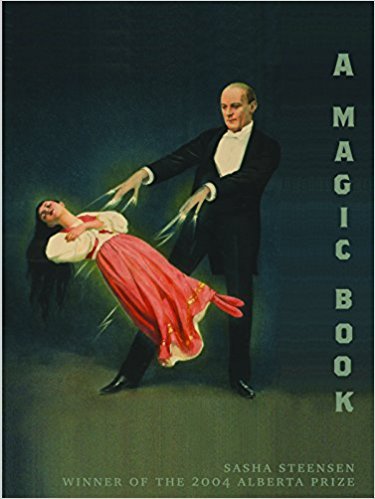THE METHOD
The Method is a manuscript of theorems and proofs written and diagrammed by the mathematician Archimedes in Syracuse around 250 bc. The Method is a book of poems by Sasha Steensen. The former is a text that has survived, at least in parts, through a series of processes that includes palimpsesting, thievery, obscurantism, acquisition, and conservation. The latter text takes the former and its history, which has been invisible, overwritten, and requisitioned for use value, as a jumping-off place for her own meditation on the relationships that develop between a person and her historical truth, a person and her writings. Steensen’s The Method treads carefully in the terrain of fact that foregrounds her investigations, and emerges centuries and centuries on in the only moment that remains to us. “I thought:// The Method, so happily recovered./ I am the one who called us all together./ I driven time./ I wars and waves./ I was./ I go over sea-lanes rife with fish./ I did not.// I saw a shadow on the water./ I know this situation makes a perfect poem,/ but I will not.”
“What or who is The Method? Charming, dangerous, love-struck, mistaken—an angle of the human mind. Trapped together in nets of language, geometries of battle, the human words prove themselves cyclical, as centuries feed one another like nutritive springs mid-sea. Somewhere in there, men and women found ways to measure the world’s parts, and these poems show us the forms, as we sit down at the table (set down in this book) with The Method to partake of the ‘bottomless years.'” —Eleni Sikelianos
“If whatever it is that makes humanity so messed up were separable from us and wound itself assiduously through every part of our history, if that otherness could announce itself as orphaned baby or monster or missing manuscript, if our behaviors made it as uncomfortable and unhappy as it made us, there would be Method to our madness, and Sasha Steensen would have mapped it in her latest, which in its wit and dark didactic elegance is going to keep me up at night.” —Catherine Wagner
REVIEWS
This cycle of poems centering on the history of a manuscript of theorems and proofs by Archimedes—also called The Method, and composed in Syracuse around 250 B.C.—raises deep questions, sometimes asked by Archimedes’ book itself, about the forces that act upon a text to change and possibly corrupt its meaning: “The Method had heard some say:/ 'he or she/ took a little part of me/ when they took their leave/ of me.’” —Publisher’s Weekly
Steensen’s tracing of the past is, we realize, all about the present, or rather how the present’s formed in part from our anxieties about the illusion of the future, to misquote the title of that central section. Olson’s line was projected, written in advance of the completion of Maximus, but it was also retrospective, an attempt to assemble the markers of a life. Here, in Steensen’s hands, it marks the impasse of the creative mind: “Imaginary friends attended the first tea party I ever hosted, and those same friends will likely attend the last.” —Los Angeles Review of Books
The Method, Sasha Steensen’s most recent collection of poems, calls on a controversial and mysterious text from the past (Archimedes’ manuscript of geometrical proofs, also entitled The Method) to read the present. The original Method is completely changed from what it initially was, and Steensen thoroughly explores this transformation in her poems. Steensen successfully constructs an original and unique text, while at the same time relying on the history that is associated with the first Method, and also with Archimedes himself. —Redivider: A Journal of New Literature and Art
According to the cover of the book, “The Method is a manuscript of theorems and proofs written and diagrammed by the mathematician Archimedes in Syracuse around 250 bc. The Method is a book of poems by Sasha Steensen. The former is a text that has survived, at least in parts, through a series of processes that includes palimpsesting, thievery, obscurantism, acquisition, and conservation.” —Galatea Resurrects
From Fence Books comes the latest book from the young poet Sasha Steenson. The Method refers, tangentially, to a text by the Greek mathematician Archimedes, which over the course of time has survived via rewritings, overwritings, and underwritings. The Archimedes text manifests itself in Steenson’s poems as a character, named the Method, which is part man, part abstract idea, and part text. —Bookslut
A book lost, found, written over by prayers and bills of lading, stolen leaves transported to Cambridge, auctioned at Christie's, a journey become a dream palimpsest by Sasha Steensen. Read in a single gulp this morning from which I pulled myself free as reluctantly as from my morning dreams of a few hours earlier. Found yesterday at Robin's lying on the table in the back where books of poetry are shelved, this is poetry that makes me wish there were no need in my life for anything but reading poetry. —Barking Dog





